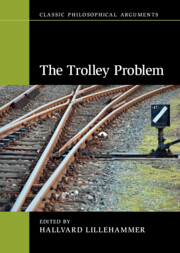Book contents
- The Trolley Problem
- Classic Philosophical Arguments
- The Trolley Problem
- Copyright page
- Contents
- Tables
- Contributors
- Acknowledgments
- Introduction
- 1 Keeping track of your trolleys
- 2 Shunted trolleys and other diversions
- 3 Must we turn the trolley?
- 4 Non-consequentialism in light of the trolley problem
- 5 Non-consequentialist principles under conditions of uncertainty
- 6 The trolley problem and the doing/allowing distinction
- 7 Virtue ethics and the trolley problem
- 8 Trolley dilemmas from the philosopher’s armchair to the psychologist’s lab
- 9 Trolleyology
- 10 Cross-cultural responses to trolley problems and their implications for moral philosophy or
- 11 Ethical accident algorithms for autonomous vehicles and the trolley problem
- 12 A new trolley problem?
- Bibliography
- Index
3 - Must we turn the trolley?
Published online by Cambridge University Press: 24 February 2023
- The Trolley Problem
- Classic Philosophical Arguments
- The Trolley Problem
- Copyright page
- Contents
- Tables
- Contributors
- Acknowledgments
- Introduction
- 1 Keeping track of your trolleys
- 2 Shunted trolleys and other diversions
- 3 Must we turn the trolley?
- 4 Non-consequentialism in light of the trolley problem
- 5 Non-consequentialist principles under conditions of uncertainty
- 6 The trolley problem and the doing/allowing distinction
- 7 Virtue ethics and the trolley problem
- 8 Trolley dilemmas from the philosopher’s armchair to the psychologist’s lab
- 9 Trolleyology
- 10 Cross-cultural responses to trolley problems and their implications for moral philosophy or
- 11 Ethical accident algorithms for autonomous vehicles and the trolley problem
- 12 A new trolley problem?
- Bibliography
- Index
Summary
Helen Frowe argues against a common view of the standard Trolley Scenario according to which it is permissible but not required to kill the one as a side effect of saving the five. She argues that saving the five and killing the one is morally required in that scenario. I defend the intuitive verdict that it is permitted but not required to turn the trolley in the Trolley Scenario. First, I show that the crucial premise of Frowe’s argument – the premise that one has a duty to prevent harm to others when one can do so without violating anyone’s rights, and without bearing an unreasonable cost – is false. And second, I present an independent argument (one originally offered by Frances Kamm) for the permissibility of not turning the trolley in the Trolley Scenario.
- Type
- Chapter
- Information
- The Trolley Problem , pp. 42 - 58Publisher: Cambridge University PressPrint publication year: 2023

